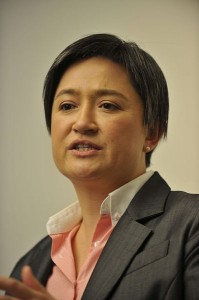conservative feminism: a complex conviction

A questioner on last Monday’s Q&A on the ABC raised an interesting and important topic for debate amongst the Q&A panellists. Her question, put simply, was: ‘Do feminist women have a place within Australia’s politically conservative domain?’
The idea of feminism and conservatism merging together to create a friendly ideological meeting seems convoluted and perhaps paradoxical. Indeed, social and religious conservatism, brands that political conservatism sometimes interacts with, have had some role defining connotations, especially for women.
Labor Senator, Penny Wong defended and upheld her feminist views on the program, recently expressed in her now well-known feminist speech. But, contrary to what Senator Wong has stated, is contemporary feminism an ideology of left-wing values in Australia?
Liberal Senator Marise Payne, on Q&A described herself as a feminist, citing that gender imbalance is still prevalent in some social and economic sectors. I’m sure some would argue that Senator Payne’s viewpoint is far removed from the traditional Liberal Party agenda. However, what Senator Payne implies in her claim to being a feminist is that an individual can have differing views from their political party’s ideologies and still be conservative. Even conservative women had a part to play in the early Australian suffrage movement.
In her book, Gendered Government, Louise Chappell states that Australian ‘conservative parties have been sites for women, and some feminists.’ In the 1980s, The Victorian Liberal Feminist Network established itself with a need to promote feminist values in the Liberal Party. In 1993 the Liberal Women’s Forum sought to get more women to join the Liberal Party, citing that women’s representation in politics was imbalanced.
Although these parties didn’t collectively self-identify as feminists, their ideals certainly steamed from a similar philosophy. In her time as Minister for the Status of Women in NSW, Former NSW leader of the Liberal Party, Kerry Chikarovski, put forward a conservative feminist agenda, personally identifying as a feminist.
Yet, some members, like the former Minister for the Status of Women in the Howard government, Jocelyn Newman, and of course Minister Assisting the Prime Minister for Women, Michaelia Cash, have come to disown feminism and feminist aims even though they embrace the philosophies. As Chappell argues, ‘Despite the presence of feminists in the ranks of the conservative parties […] amongst both male and female members of these parties, there has been little tolerance for feminist principals […] Feminists still have a long way to go in terms of having their objectives embraced by the conservative side of politics.’
Businesswoman, economist and Liberal Party affiliate Judith Sloan seemed to buttress some different definitions of feminism on Q&A too. ‘Look, I think feminism, when it is the issue of allowing free choice and equal opportunity for women, I’m absolutely signed up and I’m signed up for my daughters. When it comes to feminism where it’s about hatred of men or blaming men for the problems, I’m not up for that.’ Sloan’s comment seems to typify a contemporary conservative view on feminism, that is, that conservatives seem confused with the feminist label, causing them to distort or redefine feminism for their own political or social agenda.
However, as Senator Wong suggests in her speech, feminism itself should transcend political ideals, especially in contemporary society. The notion that a conservative government doesn’t need a label like feminism, or that they can redefine the label snuffs out what Senator Wong suggests: that all the rights women have fought for need not be remembered and upheld. Furthermore, even if feminism is incongruent with some traditionally conservative values, this should not mean that members of a conservative party should personally stifle their views to toe the party line.
Senator Wong is right; we need more conservative women who identify openly as feminists. Not only that, but we need more parliamentarians of all genders to stand up for feminism.

